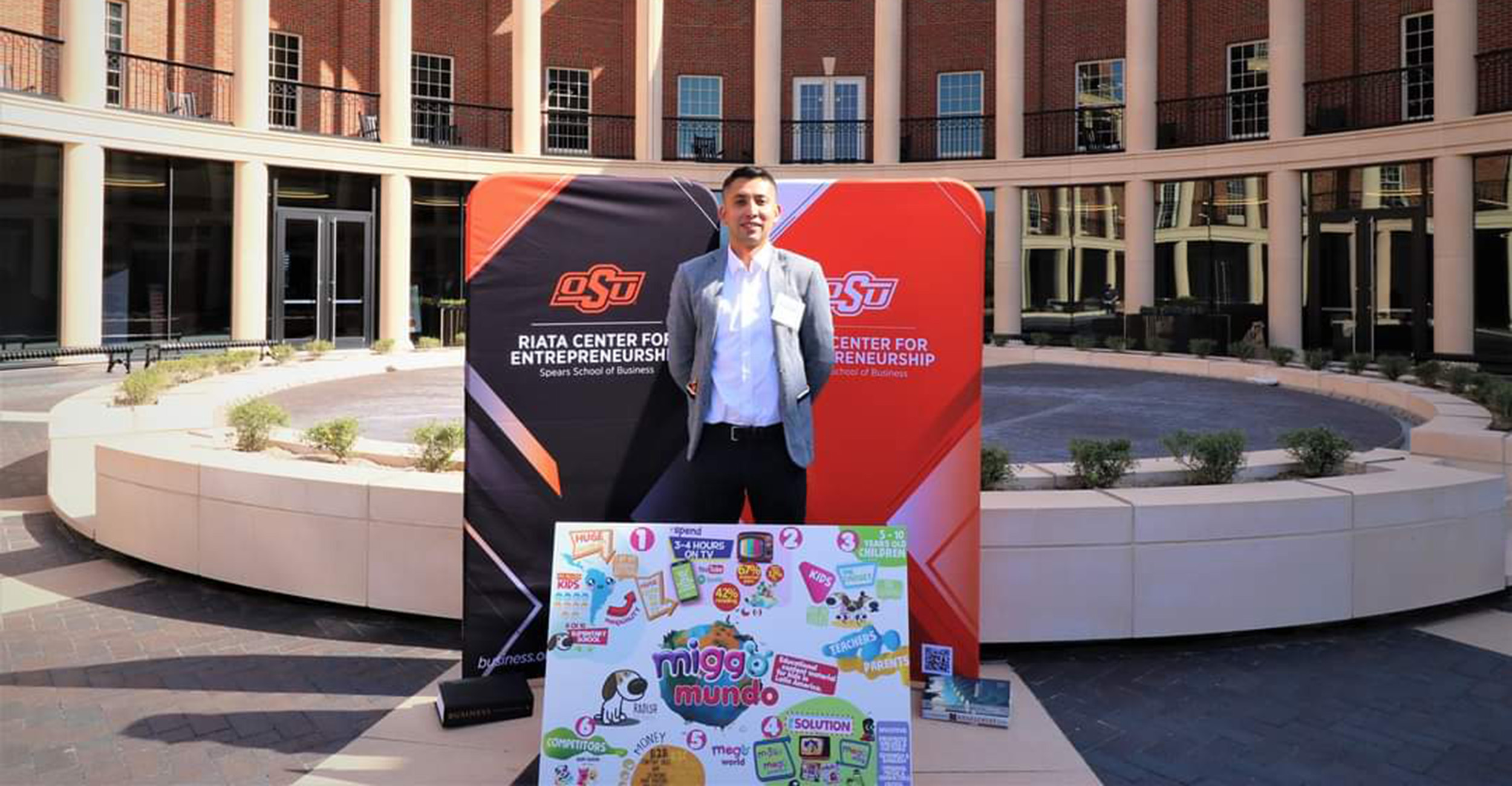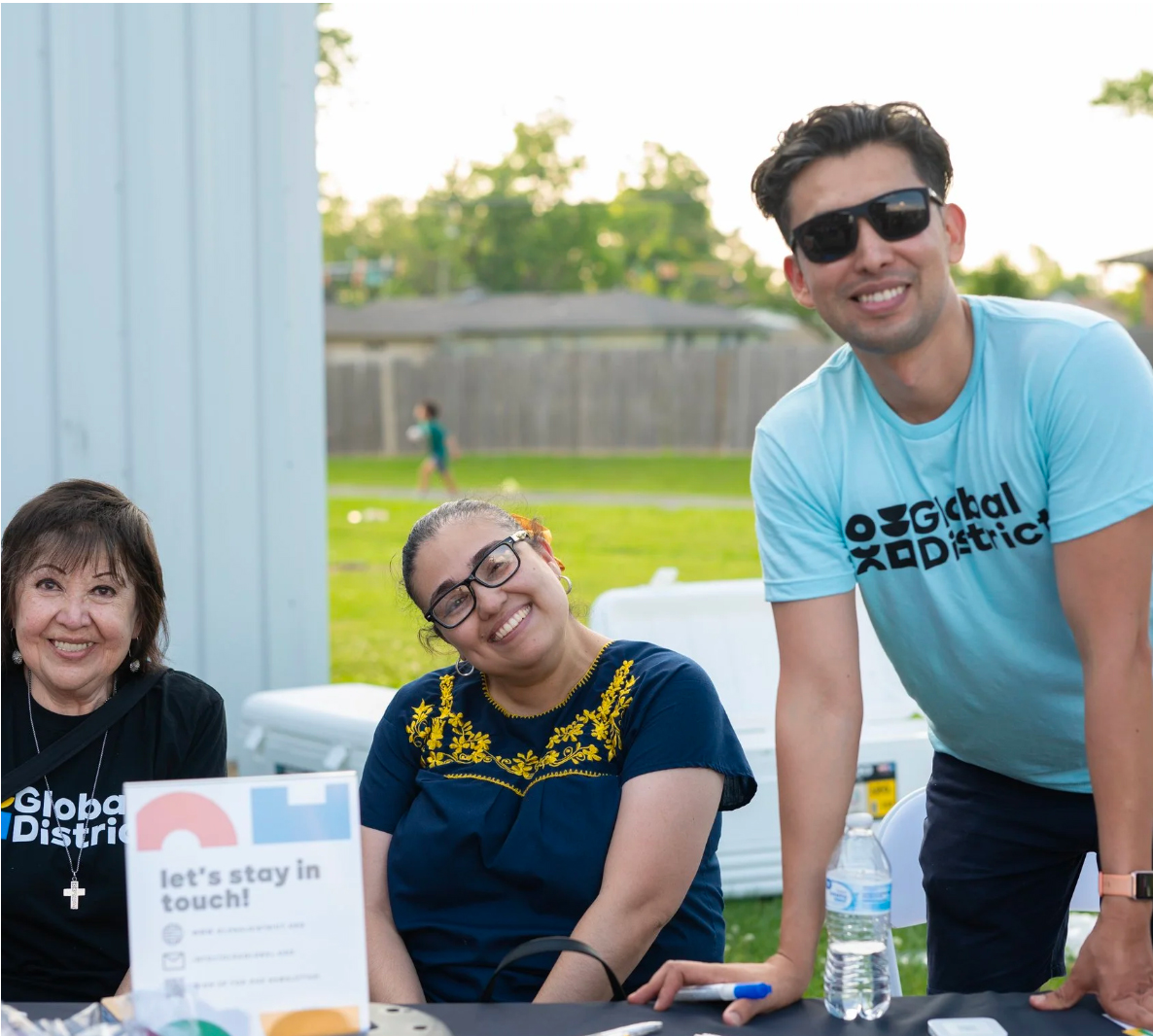
Alumni Q&A: MBA graduate Garcia champions entrepreneurship as Tulsa Global District Executive Director
Thursday, October 16, 2025
Media Contact: Hallie Hart | Communications Coordinator | 405-744-1050 | hallie.hart@okstate.edu
Alejandro Garcia knows the challenges and joys of starting a business.
He launched a marketing agency, composed radio jingles and won advertising awards before earning his MBA from Oklahoma State University’s Spears School of Business.
Today, he blends his education and industry experience to support fellow entrepreneurs.
Garcia serves as executive director of the Tulsa Global District, home to about 200 local businesses. The district is accredited through Main Street America, a network committed to revitalizing historic downtowns and commercial corridors nationwide.
With Garcia’s leadership, the Tulsa Global District is the recipient of the 2025 Oklahoma Main Street Outstanding Image Promotion award and a semifinalist in the 2026 Great American Main Street Awards. In September, Garcia was named Tulsa Regional Tourism’s Hospitality Champion in the nonprofit category.
Q: What led you to OSU’s MBA program?
Garcia: In 2020, when COVID hit, my business was still running, just not as busy as usual. I’ve always been a bit of a workaholic, so having things slow down felt strange. Those “forced vacations” gave me the chance to finally do something I’d been putting off for years: pursue a master’s degree.
At first, I planned to study back in Europe, but I started at UPAEP in Mexico, where I discovered their dual-degree program with OSU. It sounded like the perfect opportunity — earning two master’s degrees, one in Mexico and one in the United States.
Honestly, I didn’t even know much about OSU or Oklahoma before applying, but that decision completely changed my path. I arrived in Stillwater in 2021, fell in love with the community and the school spirit, and graduated in 2023 after adding a graduate certificate in entrepreneurship. Looking back, it’s funny how what started as an unexpected global slowdown turned into one of the most transformative experiences of my life.
After building a career as an award-winning marketer and advertiser, what inspired you to shift to nonprofit community work?
I actually won my first advertising awards very young, almost right after finishing my undergraduate degree. Within the first year of running my business, I was already listed among Mexico’s top creative firms and even earned my first international recognition in Spain. At that time, nonprofit or social impact work felt very far from my world. I was focused on growth, brands and clients.
But over time, I realized that the line between corporate and nonprofit work is much thinner than it seems. Nonprofits need everything a business does — strategy, operations, marketing, management. The only difference is that instead of generating profit, the goal is to reinvest in the community.
Honestly, that realization started at OSU. While participating in the Riata Center competitions, I entered nonprofit-related categories for the first time. That’s where I began to truly understand what being a nonprofit organization means, especially in this country. Coming from Mexico, where the nonprofit ecosystem is very different, learning how community-based work operates here was very new to me.
How do you use your Spears Business background in your career today?
What the Spears MBA gave me was structure. It connected the dots and gave names and strategies to things I had been doing for years. Now, as the Executive Director of the Tulsa Global District — a Main Street America program supporting small businesses and entrepreneurs in one of Tulsa’s most vibrant and diverse areas — I use those tools every single day.
From strategic planning and data analysis to leadership and community partnerships, the MBA helped me refine how I approach challenges. It didn’t just make me a better professional — it made me see how business can be a true force for community growth.

What do you enjoy most about working with small businesses and local entrepreneurs?
Before becoming the executive director of the Global District, I started as the small business specialist. That role meant being in direct contact with entrepreneurs and business owners across the district, helping them with whatever they needed. I got to work with people from all kinds of backgrounds — family businesses, new startups, digital entrepreneurs and longtime shop owners, many of them immigrants speaking different languages.
What I’ve learned is that no matter where people come from or what type of business they run, they often face the same challenges. It reminds me a lot of when I started my own company. I began completely on my own and grew it to two offices in different cities in Mexico with more than 20 employees over 15 years. So, I know exactly what it’s like to start from zero. Seeing these local entrepreneurs at different stages of their journey excites me because it takes me back to my own beginnings, and I love being able to share what worked for me and what to avoid. I’ve also learned so much from them.
If something adds value to a market, it can succeed. But ultimately, it’s the entrepreneur that makes the difference. You can tell when someone has that fire and determination to make it work. And sometimes, part of supporting entrepreneurs is also helping them realize when their path might be a different one, because not everyone is meant to start a business, and that’s OK, too. What matters is helping people find their right path to success.
The Tulsa Global District website includes a great focus on public art. How would you describe the role of the arts in vitalizing a community, beyond dollars and cents?
Art is global — I’d even say universal. It’s one of the few things that truly connects people everywhere, which makes it a perfect fit for the Global District. With such a rich and multicultural community, art becomes a natural way to express who we are.
As part of the Main Street America program, public art also plays an essential role in revitalization. It brings beauty, pride and a stronger sense of identity to the area. But in the Global District, it goes beyond that. Projects like The Dragon Trail (art and biking experience) or our community murals capture that unique blend of cultures and economies that make this area so dynamic. It’s art that tells our story — one of collaboration, creativity and belonging.
The Tulsa Global District also just reached a milestone with its first La Fiesta de Tulsa Parade for Hispanic Heritage Month. What was it like to see the turnout with multicultural communities, schools and city leaders gathering for the event?
The Global District hosts several events every year, but our two biggest ones are the Asian American Night Market in May, celebrating Asian American and Pacific Islander Heritage Month, and La Fiesta de Tulsa in September for Hispanic Heritage Month. Both are massive community celebrations, each bringing over 4,000 people and creating a real economic impact for the district and our local entrepreneurs.
This year was especially meaningful for me because it was my first time organizing both events as Executive Director. We partnered with the Consulate of Mexico in Oklahoma and, for the first time in East Tulsa’s history, held the official “Grito de Independencia” ceremony, led by Consul Edurne Pineda. And of course, we also had the very first parade in partnership with Tulsa Public Schools, on the east side of Tulsa. I had never organized a parade before, but seeing it come to life was amazing.
Beyond the celebration itself, it meant so much to see the community come together — especially in times when immigrant communities, particularly Hispanic ones, often face negativity or misunderstanding. Events like this remind everyone of how much our community contributes to Tulsa’s culture and economy. The turnout broke records, and what stood out most was the unity — people from all backgrounds came together to celebrate. That’s what made it truly special: it wasn’t just a Hispanic event; it was a Tulsa event.
What advice would you offer to a Spears Business student interested in entrepreneurship?
I was very young when I started my first business, right after finishing college. It definitely wasn’t easy. What I learned is that you must be completely confident in your project, and to gain that confidence, you have to challenge it. It’s your “baby,” and of course you want to protect it, but you also have to test it. If it truly works and you believe in it, that belief will keep you going through tough times. At the same time, you have to be honest with yourself about whether entrepreneurship is really what you want.
As a young entrepreneur, I made countless mistakes. Maybe working for someone else first would’ve given me some experience, but I’ll never know. What I do recommend is staying open to learning from people with more experience without getting defensive. Listening and learning from others helps immensely.
Step outside your comfort zone. Meet different kinds of people, explore new environments, learn other languages and, if you can, travel to another country, but not just as a tourist — travel to experience different perspectives. Broadening your perspective is one of the most valuable things you can do, not just for business, but for life.
Visit the website to learn more about the Watson Graduate School of Management’s MBA offerings, including dual-degree programs.
